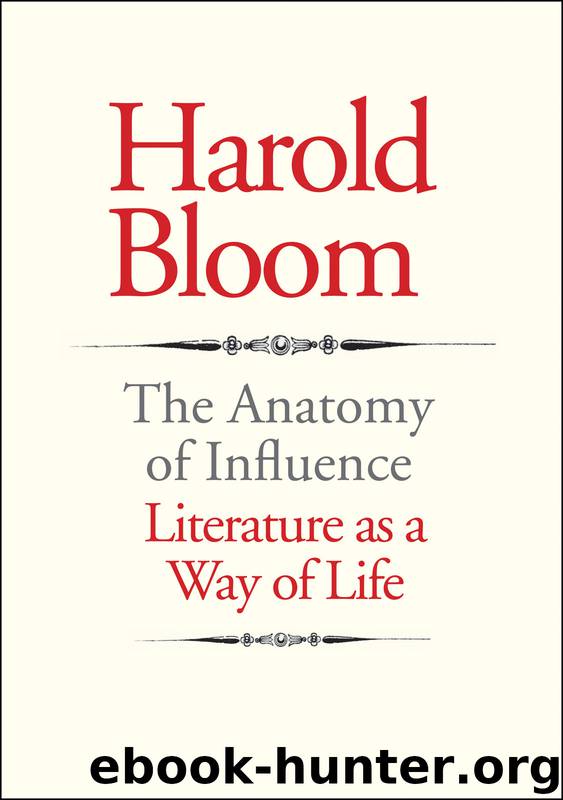The Anatomy of Influence by Harold Bloom

Author:Harold Bloom
Language: eng
Format: epub
Publisher: Yale University Press
Published: 2011-07-13T16:00:00+00:00
[Browning, “An Essay on Percy Bysshe Shelley”]
The first of these reflects Browning’s sense of personal betrayal, in contrast to Shelley’s remorseless integrity, while the second gives the palm to Shelley’s subjectivity in preference to what Browning regarded as his own hard-won objectivity. In the third passage, which is as knotty as a Browningesque poem, we hear a defense of his own achievements in “objectivity,” which Yeats was too shrewd an antithetical quester altogether to believe. Browning’s strongest poems—“‘Childe Roland to the Dark Tower Came,’” “Andrea del Sarto,” “Fra Lippo Lippi,” among others—are as subjective as “Pauline.” They too are fragments of a great confession.
Why did the exuberantly optimistic Browning, characterized by Gerard Manley Hopkins as “bouncing Browning,” create a portrait gallery of self-ruined monomaniacs, charlatans, voluntary failures, and suicidal grotesques? I once believed that Browning, on some level of consciousness, was expiating for the failure in will when he yielded to his mother’s Evangelical outrage, but that now seems simplistic. Browning inwardly was a daimon, in rather the way that Ibsen was a troll. Preternatural energies surged in Browning, who was in many ways far more subjective than was his beloved Shelley, an intellectual skeptic. Head and heart opposed one another in Shelley; I am uncertain that I can distinguish intellect from emotion anywhere in Browning’s greater poems.
Shelley is the English lyric poet proper: his progeny—Browning, Yeats, Thomas Hardy—cannot be characterized as lyricists, since even the early Yeats aspired to write esoteric and occult scriptures. To find a Shelleyan lyric poet of magnitude, I go to Hart Crane, a Pindaric rhapsode who conveys Shelley’s incantatory style into the twentieth century. Browning in that century was followed by Ezra Pound and the early T. S. Eliot as dramatic monologists. In my own generation Browning’s legacy was sustained by the late Edgar Bowers and Richard Howard.
In teaching Browning these days, I frequently find that half my class falls in love with his work while the other half remains puzzled by my passionate insistence that Browning and Whitman are the major poets in the language after the High Romantics, surpassing even Yeats and Stevens. The resistance to Browning goes back to some of his contemporaries, including Hopkins, who was fascinated and frightened by Whitman, who seemed to the Jesuit poet his own self unmasked. For the ordinarily astute Hopkins, Browning was not even a poet. Oscar Wilde agreed, but added that Browning was “the most supreme writer of fiction, it may be, that we have ever had.” As a creator of character, Browning approached Shakespeare. Wilde, being Oscar, could not forbear from going on to a famous observation: “The only man who can touch the hem of his garment is George Meredith. Meredith is a prose Browning, and so is Browning. He used poetry as a medium for writing in prose.”
Character criticism in regard to Shakespeare went out of fashion after A. C. Bradley, despite a noble last stand by Harold Goddard and my own more recent efforts to revive the spirits of Maurice Morgann and Goddard.
Download
This site does not store any files on its server. We only index and link to content provided by other sites. Please contact the content providers to delete copyright contents if any and email us, we'll remove relevant links or contents immediately.
4 3 2 1: A Novel by Paul Auster(12382)
The handmaid's tale by Margaret Atwood(7760)
Giovanni's Room by James Baldwin(7334)
Asking the Right Questions: A Guide to Critical Thinking by M. Neil Browne & Stuart M. Keeley(5766)
Big Magic: Creative Living Beyond Fear by Elizabeth Gilbert(5760)
Ego Is the Enemy by Ryan Holiday(5423)
The Body: A Guide for Occupants by Bill Bryson(5086)
On Writing A Memoir of the Craft by Stephen King(4938)
Ken Follett - World without end by Ken Follett(4726)
Adulting by Kelly Williams Brown(4569)
Bluets by Maggie Nelson(4549)
Eat That Frog! by Brian Tracy(4528)
Guilty Pleasures by Laurell K Hamilton(4443)
The Poetry of Pablo Neruda by Pablo Neruda(4100)
Alive: The Story of the Andes Survivors by Piers Paul Read(4025)
White Noise - A Novel by Don DeLillo(4006)
Fingerprints of the Gods by Graham Hancock(3999)
The Book of Joy by Dalai Lama(3978)
The Bookshop by Penelope Fitzgerald(3847)
